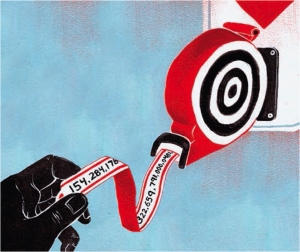 More than two decades ago, the Supreme Court of Canada in R. v. Askov decided that criminal cases must be brought to trial in six to eight months — the Constitution demanded it. And it made good sense: after a few months, memories fail and everyone involved in a criminal trial, from police to eyewitnesses, becomes less reliable.
More than two decades ago, the Supreme Court of Canada in R. v. Askov decided that criminal cases must be brought to trial in six to eight months — the Constitution demanded it. And it made good sense: after a few months, memories fail and everyone involved in a criminal trial, from police to eyewitnesses, becomes less reliable.
Since that ruling, the court system has not changed dramatically. People still wait far too long for trials and no one seems accountable. The Charter is being ignored. The right to a speedy trial is an illusion.
There was an immediate impact after the Askov ruling. In the six-month period following the decision, the federal government threw out over 34,000 charges, many of them drug cases. In Ontario alone, 47,000 criminal charges were stayed or withdrawn in a one year period. The right to a speedy trial had teeth. It meant something.
But things soon went back to “normal” and delays mounted to pre-Askov levels. In June 2008, Ontario’s Attorney General announced a project called Justice on Target. Clearly inspired by Askov, it was supposed to reduce the provincial average number of days and court appearances necessary to resolve criminal cases by 30 percent. Instead, the program rushes some accused persons through the courts, providing incentives to plead guilty, giving up their right to a trial. When the government touts the success of this program, it cites the number of court appearances it has reduced, but it does not disclose figures on trial delay.
Some Toronto-area courthouses have stayed stagnant or actually worsened under Justice on Target. At College Park, the average number of days taken to reach trial rose from 221 days in 2007 (7.3 months), to 290 days in 2010 (9.6 months). Other courthouses have shown modest improvements, but none of any significance. Time delays have not changed for more than two decades in many Toronto courthouses.
Had the initial judicial momentum for government accountability continued when Askov landed 23 years ago, we could have had trials in a maximum of six months. The attorney general is the primary problem, but much responsibility rests with the appellate courts that tolerate, enable and constantly excuse Crown delay. Even the Supreme Court of Canada has “re-visited” Askov and stressed that the already generous time guidelines given in that case were, well, flexible.
With courts of appeal closing their eyes, individual judges have cheerfully chipped away at the right to trial within a reasonable time. For example in 2011, the Ontario Court of Appeal decided “neutral delay” — which the courts count as no delay at all — included the time between finding a real trial date and the imaginary date on which the court thinks counsel would have been ready to argue the case. Make sense? Not in this universe.
What’s more, Ontario no longer bothers to keep track of the number of cases thrown out for unconstitutional delay.
Every once in a while, someone stands up and stops the insanity. Recently, Justice Stephen Brown of the Ontario Court of Justice in Burlington withdrew one count of driving “over 80” because of delay, noting, “We are about to experience another Askov apocalypse in Halton Region if further resources are not dedicated immediately.”
We need real solutions. Instead, we get shameless excuses from appellate courts and programs with catchy names that yield no results. Courts need proper funding, and charges must be dropped when the right to a speedy trial is a mere illusion. Our fundamental rights cannot be put on the backburner. The government needs to stand up, do the right thing, and hold the system to account.
Clayton Ruby is a lawyer at Ruby Shiller Chan Hasan and editor of the Canadian Rights Reporter. He was counsel in R. v. Askov in 1990.
Angela Chaisson is a lawyer at Ruby Shiller Chan Hasan. During Askov, she was only six, and was unable to attend.
Illustration by Jeanne Phan


